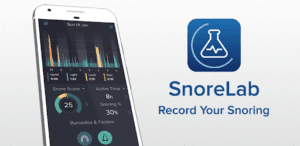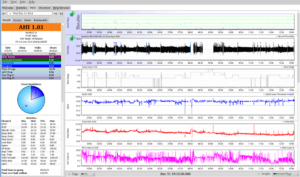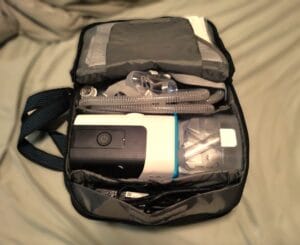Ensuring a good night’s sleep for those with sleep apnea involves a combination of lifestyle changes, sleep hygiene practices, and adherence to prescribed treatments.
Here are some top tips:
1.) Use CPAP Machine Nightly
Go to bed and wake up at the same time every day, even on weekends. Consistency reinforces your body’s natural sleep-wake cycle.
2.) Maintain a Regular Sleep Schedule
If your doctor has prescribed Continuous Positive Airway Pressure (CPAP) therapy, use your CPAP machine consistently every night. It helps keep your airway open and prevents interruptions in breathing.
3.) Create a Comfortable Sleep Environment
Make your bedroom conducive to sleep by keeping it cool, dark, and quiet. Invest in a comfortable mattress and pillows.
4.) Sleep on Your Side
Sleeping on your side can help prevent the collapse of the airway. Consider using a body pillow to maintain a side-sleeping position.
5.) Avoid Alcohol & Sedatives
These substances can relax the muscles in your throat, worsening sleep apnea symptoms. Limit their intake, especially close to bedtime.
6.) Maintain a Healthy Weight
Losing excess weight can reduce the severity of sleep apnea. Adopting a healthy diet and regular exercise routine can contribute to weight management.
7.) Limit Screen Time Before Bed
The blue light emitted by screens can interfere with the production of the sleep hormone melatonin. Aim to reduce screen time at least an hour before bedtime.
8.) Stay Active & Exercise
Regular physical activity can improve overall sleep quality. Aim for at least 30 minutes of moderate exercise most days of the week, but avoid vigorous exercise close to bedtime.
9.) Elevate Your Head
Sleeping with your head elevated may help keep airways open. You can achieve this by using a wedge pillow or adjusting the head of your bed.
10.) Stay Hydrated & Drink Water
Dehydration can make snoring and sleep apnea worse. Ensure you stay adequately hydrated throughout the day, but limit fluid intake close to bedtime to avoid disruptions from bathroom visits.
11.) Practice Relaxation Techniques
Incorporate relaxation techniques, such as deep breathing exercises or meditation, into your bedtime routine to help reduce stress and promote better sleep.
12.) Regular Follow-Ups with Your Doctor
Schedule regular check-ups with your healthcare provider to monitor your sleep apnea and adjust your treatment plan as needed.
Always consult with your healthcare provider before making significant changes to your lifestyle or treatment plan. These tips are general recommendations and may need to be customized based on individual health conditions.




